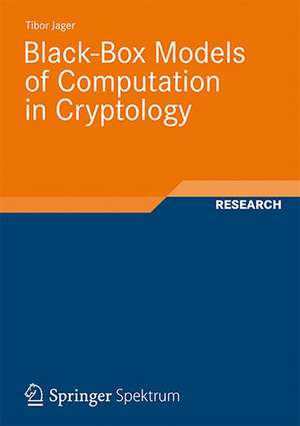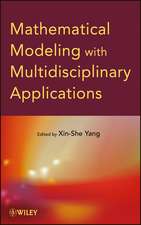Black-Box Models of Computation in Cryptology
Autor Tibor Jageren Limba Engleză Paperback – 22 mar 2012
Tibor Jager addresses several fundamental questions concerning algebraic black-box models of computation: Are the generic group model and its variants a reasonable abstraction? What are the limitations of these models? Can we relax these models to bring them closer to the reality?
Preț: 375.84 lei
Nou
Puncte Express: 564
Preț estimativ în valută:
71.92€ • 75.09$ • 59.52£
71.92€ • 75.09$ • 59.52£
Carte tipărită la comandă
Livrare economică 05-19 aprilie
Preluare comenzi: 021 569.72.76
Specificații
ISBN-13: 9783834819895
ISBN-10: 3834819891
Pagini: 78
Ilustrații: XII, 86 p.
Dimensiuni: 148 x 210 x 10 mm
Greutate: 0.13 kg
Ediția:2012
Editura: Vieweg+Teubner Verlag
Colecția Vieweg+Teubner Verlag
Locul publicării:Wiesbaden, Germany
ISBN-10: 3834819891
Pagini: 78
Ilustrații: XII, 86 p.
Dimensiuni: 148 x 210 x 10 mm
Greutate: 0.13 kg
Ediția:2012
Editura: Vieweg+Teubner Verlag
Colecția Vieweg+Teubner Verlag
Locul publicării:Wiesbaden, Germany
Public țintă
ResearchCuprins
Black-Box Models of Computation.- On Black-Box Ring Extraction and Integer Factorization.- On the Analysis of Cryptographic Assumptions in the Generic Ring Model.- The Generic Composite Residuosity Problem.- Semi-Generic Groups and Their Applications.
Notă biografică
Dr. Tibor Jager completed his doctoral thesis at the Horst Görtz Institute for IT Security at Ruhr-Universität Bochum under the supervision of Prof. Dr. Jörg Schwenk. He is now a postdoctoral researcher at the Karlsruhe Institute of Technology.
Textul de pe ultima copertă
Generic group algorithms solve computational problems defined over algebraic groups without exploiting properties of a particular representation of group elements. This is modeled by treating the group as a black-box. The fact that a computational problem cannot be solved by a reasonably restricted class of algorithms may be seen as support towards the conjecture that the problem is also hard in the classical Turing machine model. Moreover, a lower complexity bound for certain algorithms is a helpful insight for the search for cryptanalytic algorithms.
Tibor Jager addresses several fundamental questions concerning algebraic black-box models of computation: Are the generic group model and its variants a reasonable abstraction? What are the limitations of these models? Can we relax these models to bring them closer to the reality?
Tibor Jager addresses several fundamental questions concerning algebraic black-box models of computation: Are the generic group model and its variants a reasonable abstraction? What are the limitations of these models? Can we relax these models to bring them closer to the reality?
Caracteristici
Black-Box Models of Computation









